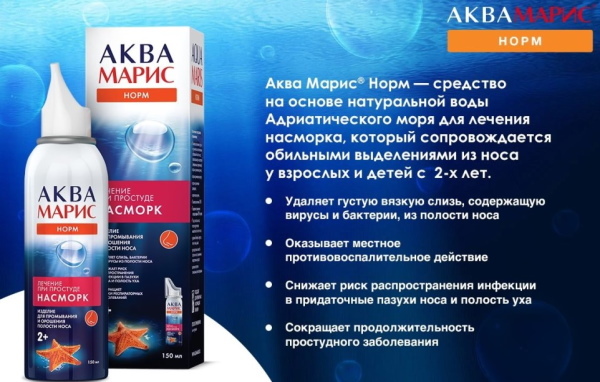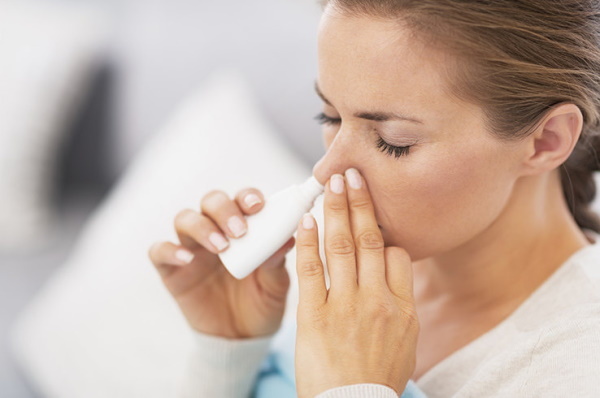Diseases of the respiratory system in children account for about 60% of all diseases. Almost all infectious and inflammatory diseases end in the development of cough, which, due to immaturity of children's bronchi, rarely productive enough for the disease on its own ended.
To speed up the resolution of the disease, in pediatric practice they resort to the use of mucolytics. Syrup Bronchorus is one of the representatives of this group of drugs, which is prescribed for children, sometimes from the first day of life.
Record content:
- 1 Forms of release and composition of the drug
-
2 Pharmacological properties
- 2.1 Pharmacodynamics
- 2.2 Pharmacokinetics
- 3 Indications for use
- 4 Contraindications
- 5 At what age can the drug be used?
- 6 Instructions for use, dosage
- 7 Side effects
- 8 Overdose
- 9 special instructions
- 10 Drug interactions
- 11 Analogs
- 12 Terms, conditions of sale and storage
- 13 Price
- 14 Video about the drug Bronchorus
Forms of release and composition of the drug
The drug is available in the form of tablets and syrup. In the treatment of children under 12 years of age, as a rule, a liquid form is used - it is quickly absorbed through the stomach and is convenient for dispensing.
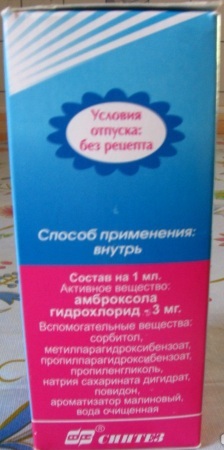
The active ingredient, ambroxol hydrochloride, is a representative of vasicinoids. This group of alkaloids is characteristic of plants and was first identified in the vascular adatode.
Its content in tablet form is 30 mg, in syrup - 3 mg / ml. By itself, it has a bitter aftertaste, which is neutralized with the help of flavors. It is an active metabolite of bromhexine and its main active ingredient.
Excipients perform mainly texturing, taste and protective functions:
- sorbitol. Used as a sweetener and thickener. 0.6 times less sweet than sugar;
- methyl parahydroxybenzoate. Preservative, has antibacterial properties;
- propyl parahydroxybenzoate - preservative, antimicrobial reagent;
- propylene glycol - helps dissolve components with different chemical properties;
- sodium saccharinate dihydrate - an artificial substitute for granulated sugar. Allowed for diabetes mellitus;
- povidone - has dispersing and stabilizing properties;
- raspberry flavor;
- purified water.
The syrup is available in 100 ml bottles. The set includes a measuring spoon.
Pharmacological properties
In the treatment of infectious diseases accompanied by mucostasis, drugs that can affect the rheological properties of sputum are of paramount importance. 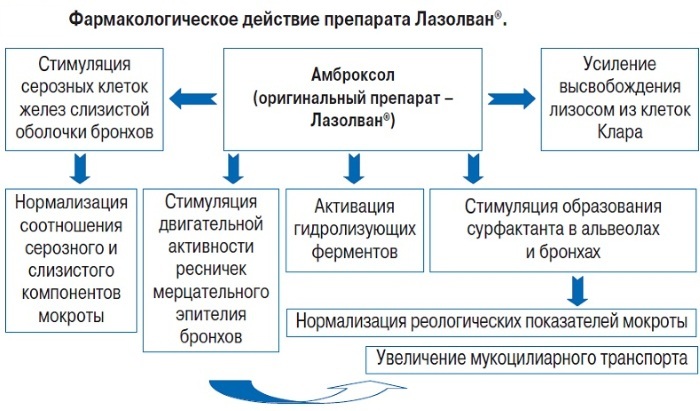 This is especially true for children of younger preschool age, the structure of the tracheobronchial tree of which is not yet sufficiently developed.
This is especially true for children of younger preschool age, the structure of the tracheobronchial tree of which is not yet sufficiently developed.
Pharmacodynamics
The effect of the drug is entirely due to the chemical properties of its component ambroxol. It is a multifactorial component that not only facilitates the passage of sputum, but also contributes to its liquefaction.
In particular, ambroxol performs the following functions:
- secretomotor - stimulates the production of serous secretion by specialized glands of the bronchi. These, along with the secretory cells Clara (goblet cells), ultimately form phlegm. The normal ratio of serous and mucous components ensures complete transport of secretions;
- secretolytic - breaks down the acidic mucopolysaccharides of the secretion, which contributes to its liquefaction and further release from the lungs;
- expectorant - stimulates the motor activity of the cilia of the ciliated epithelium of the respiratory tract. It is their oscillatory movements that lead to an increase in mucociliary clearance, which means that it contributes to the release of sputum.
Bronchorus is a syrup for children, which, along with the main pharmacological functions, has an anti-inflammatory effect. It does this by suppressing the production of inflammatory mediators. In addition, it activates local immunity by affecting the production of tissue macrophages and immunoglobulin A.
At the same time, ambroxol promotes the synthesis of a surfactant and inhibits its breakdown in second-order alveolocytes. Pulmonary surfactant, in addition to reducing the surface tension of the alveoli, performs an immune function and reduces the adhesion of secreted secretions. In this case, the drug does not increase the amount of secreted substance, but only improves mucociliary transport.
Modern research has shown that ambroxol in Bronchorus is able to suppress the replication of the influenza virus in the respiratory tract. This is possible by stimulating the production of surfactant and leukoprotease inhibitors.
To achieve the maximum therapeutic effect, while taking the drug, you must adhere to the drinking regimen, consuming more fluids than usual.
Pharmacokinetics
The active substance almost completely penetrates through the gastrointestinal tract. The maximum concentration in the blood is reached within 1-2.5 hours after oral administration of the drug. The adsorption of ambroxol is directly proportional to the dose in the therapeutic range of acceptable concentrations.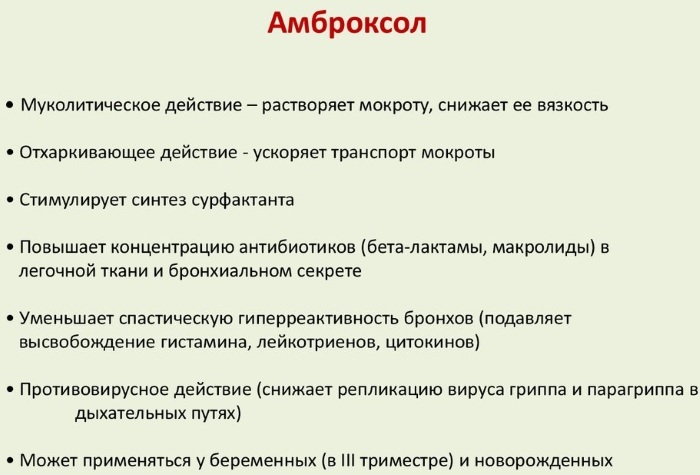
The amount of ambroxol in its unchanged form, reaching the internal tissues and organs, is 70-80% of the original volume. In this case, the greatest concentration is in the lungs. The drug binds to blood plasma proteins by 90%. The ability of ambroxol to penetrate the blood-brain and placental barriers, as well as with mother's milk, was noted.
After entering the gastrointestinal tract, 30% of the active substance undergoes "primary" biotransformation in the liver even before entering the bloodstream. Subsequently, the removal of the drug occurs by the kidneys in the form of metabolites - about 90%.
Up to 5% of the initial dose comes out unchanged. In 10 hours, Ambroxol manages to lose half of its pharmacological effect. And 5 days after a single dose of the drug, about 83% of the initial dose is excreted in the urine.
Indications for use
Bronchorus is a syrup for children, which is prescribed for acute and chronic diseases of the lower respiratory tract, accompanied by an unproductive dry or wet cough.
Most often these are:
- bronchitis, or diffuse inflammation of the bronchial mucosa;
- tracheitis - infectious inflammation of the tracheal mucosa;
-
chronic obstructive pulmonary disease (COPD), which occurs against the background of pathological hyperproduction of secretion by the cells of the pulmonary tree. Children of preschool age are especially susceptible to it, whose glandular cells work differently than in adults;
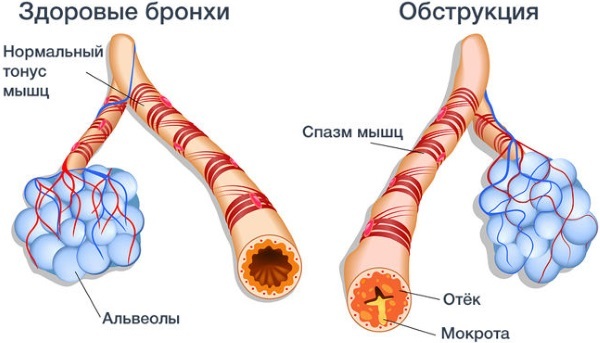
- bronchial asthma with difficult sputum discharge. It is a chronic disease, which is based on inflammation in the airways. It leads to increased reactivity of the bronchial tree;
- pneumonia. This is an infectious disease of the lung tissue, as a result of which the alveoli are filled with a purulent-inflammatory substance and cannot fully perform gas exchange. Respiratory failure may occur;
- bronchiectasis disease. At the same time, sputum discharge is difficult due to changes and destruction segments of the bronchi;
- cystic fibrosis, in which the secret produced by the glands is so thick that it cannot be fully excreted from the lungs. There is a blockage of the bronchi and bronchioles, as well as further complications with the addition of an infection;
- respiratory distress syndrome - severe inflammation of the lungs.
The drug is also prescribed to prevent possible complications in the postoperative period, when there is a risk of developing infectious diseases, as well as problems with bronchial motility.
Bronchorus and other combined mucolytics are usually prescribed for a wet, unproductive cough, when sputum formation occurs, but transportation to the proximal points is not productive.
However, it was experimentally found that taking mucolytics even with dry cough has a positive effect on the course of the disease. This is due to their secretomotor function, which eliminates the damaging effect of coughing.
Contraindications
The ability to penetrate the placental barrier classifies this drug as unacceptable during pregnancy, in particular, during the first trimester. However, there is still no data in clinical practice that would confirm the development of any disorders in the fetus in the future, after the mother took Bronhorus and other drugs based on ambroxol.
As for breastfeeding, the active substance is capable of penetrating into the mammary glands, therefore, its use is not permissible during lactation.
In the presence of hypersensitivity to the drug, or its components, the treatment should be replaced with an alternative one. Bronchorus is not acceptable for persons with fructose intolerance. It should be taken with caution in patients with renal failure and gastric ulcer and duodenal ulcer.
At what age can the drug be used?
Bronchorus is a syrup that is successfully used in the treatment of newborns, including premature babies. In pediatric practice, not a single case of complication has been identified as a result of treatment with Bronchorus in children.
Instructions for use, dosage
Using the measuring spoon that comes with the medicine, measure the exact the amount of the drug required for a particular age group:
-
for children 2-5 years old - the daily dose should not exceed 7.5 ml. It is divided into three doses and given at regular intervals in the amount of 2.5 ml. You can immediately give the child to drink juice or water;
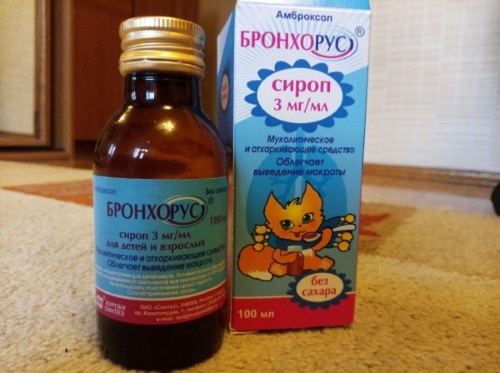
- for children 5-12 years old - shown in 5 ml of syrup 2-3 times a day. The amount may vary, especially in the first 1-2 days, when the loading dose may be slightly increased;
- adults and children over 12 years old - 10 ml 2-3 times a day.
The extreme intake of the drug is recommended to be carried out no later than 6 pm. Otherwise, the mucolytic effect will occur during sleep, which will entail significant discomfort for the child.
The course of treatment lasts on average 5-7 days. In the course of numerous studies, it has been shown that in children suffering from diseases such as bronchitis, laryngotracheitis, COPD, or pneumonia, the rheological properties of sputum improve already on the first day after administration drug.
In children with acute respiratory disease, improvement was observed already on the first day. In children with acute pneumonia, the intensity and frequency of cough decreases by 3-4 days after the start of therapy.
Any dose adjustment can be made solely on the advice of a physician or pediatrician.
Side effects
There is an insignificant risk of side effects, which mainly concerns individual drug intolerance and specific reactions from the respiratory and digestive systems:
- nausea and / or vomiting;
- dry mouth and / or mucous membranes of the upper respiratory tract;
- diarrhea, constipation;
- skin rash, allergic dermatitis (including urticaria);
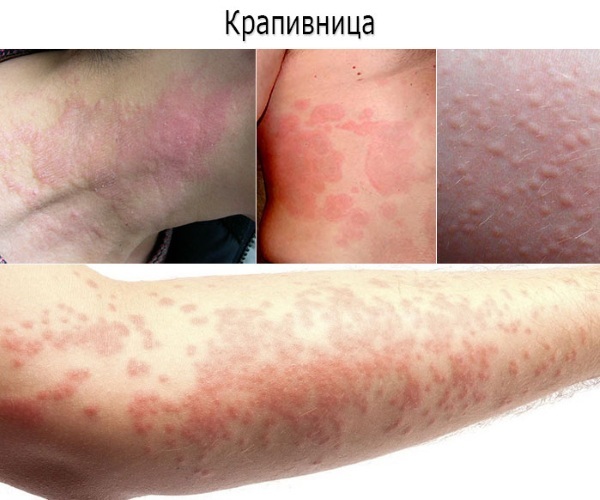
- in severe cases, Quincke's edema (angioedema), or even anaphylactic shock.
Bronchorus is a syrup for children and adults, which is safe if you adhere to the correct dosage, in accordance with age restrictions and do not prolong the course of treatment yourself.
Overdose
Symptoms of an overdose with Bronchorus are similar to those of a typical food poisoning:
- nausea;
- vomit;
- dyspepsia;
- diarrhea.
In the first 1-2 hours after the onset of the manifestation of dangerous symptoms, it is necessary to flush the stomach. Then, if possible, eat foods that are moderate or high in fat.
special instructions
Patients with impaired cough reflex and / or mucociliary transport may be prescribed Bronchorus, but there is a risk of sputum stagnation. As a result, taking a mucolytic is associated with a certain degree of risk and requires special control.
With bronchial asthma, the last dose of the drug is carried out a few hours before evening sleep. In therapy with the use of Bronchorus, cases of Stevens-Johnson syndrome have been recorded.
This complication is caused by a nonspecific sensitivity to the drug and is accompanied by rhinitis, sore throat and throughout the body, and fever. Until now, it has not been established whether this syndrome is a consequence of taking a mucolytic, or it is associated with other components of therapy.
Drug interactions
With the simultaneous use of Bronchorus and drugs such as codeine, oxeladine, prenoxdiazine, the effect of treatment will not only be leveled out, but may also result in complications.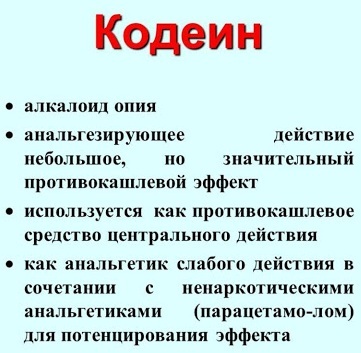
Mucolytics and antitussives are incompatible, since the action of the former is aimed at liquefying the produced sputum to facilitate its excretion, and the action of the latter is to block that very excretion.
The result is a “waterlogging effect” where fluid begins to accumulate in the lungs.
Bronchorus is a syrup for children that can and should be used in conjunction with amoxicillin, cefuroxime, erythromycin and doxycycline.
The use of Bronchorus and antibiotics makes antibiotic therapy more productive. This is due to the ability of mucolytics to uniformly accumulate the antibiotic in the focus of infection - the alveoli and bronchial mucosa. This greatly facilitates the course of the disease.
Analogs
On the basis of ambroxol, a large number of drugs are produced, presented in various dosage forms and a wide price range. The table below shows the most popular medications that pharmacists offer as an analogue of Bronhorus.
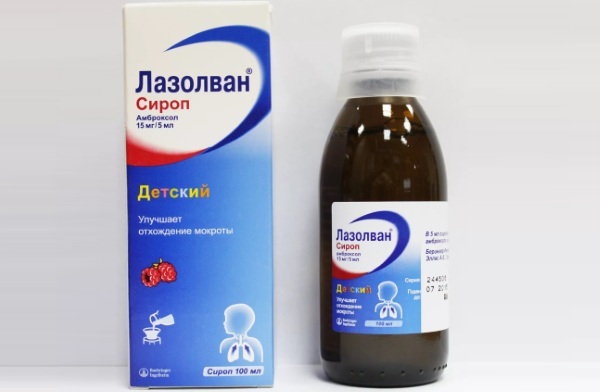
| Name | Forms of issue | Manufacturer | price, rub. |
| Ambroxol |
|
|
40-80 |
| Ambrobene |
|
|
120-200 |
| Ambrohexal |
|
Lichtenheldt GmbH Pharmacytische Fabrik / Salyutas Pharm, Germany. | 105-180 |
| Ambrosan | tablets of 30 mg | PRO.MED.CS, Prague, Czech Republic | 100 |
| Bronchoxol |
|
Moscow pharmaceutical factory, CJSC, Russia | 28-70 |
| Lazolvan |
|
|
170-370 |
| Flavamed | effervescent tablets 60 mg | Berlin-Chemie AG, Germany | 140 |
| Haliksol |
|
Egis Pharmaceutical Plant ZAO, Hungary | 105 |
The most budgetary among similar monocomponent drugs is Ambroxol. The cost of the syrup depends on the manufacturer and can range from 40 rubles.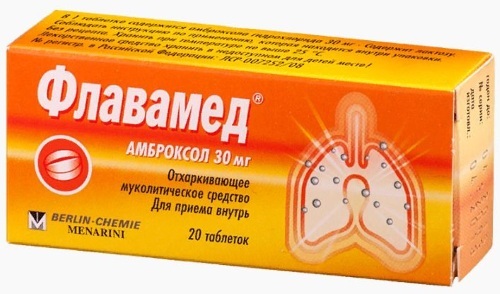
Bronchoxol is cheaper, but it contains a number of excipients - parabens, sodium disulfite and others. The most expensive trade mark is Lazolvan. The price of the syrup varies around 180 rubles. The most expensive solution is for inhalation - almost 400 rubles.
Terms, conditions of sale and storage
Bronchorus can be stored unopened for up to 3 years. Keep at a temperature not higher than + 25 ° С, in a dark place out of the reach of children.
Price
The average cost of the drug Bronchorus is 50 rubles.
In the treatment of respiratory diseases associated with difficulty in sputum discharge, mucolytics of complex action are used. Syrup Bronchorus is a medicine based on ambroxol, which is successfully used both for children from birth and for adults.
With a low risk of side effects, it rapidly has a positive effect on mucociliary transport in the lungs. Convenient dosage form and low cost makes the treatment affordable and comfortable.
Video about the drug Bronchorus
Review of Bronchorus Cough Syrup:


